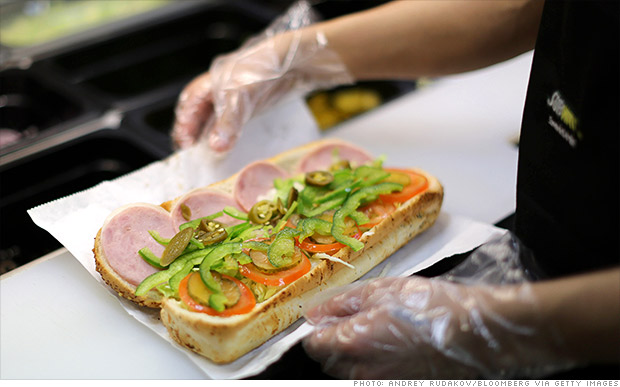Today’s post was shared by Steven Greenhouse and comes from money.cnn.com
This analysis by CNNMoney shows the impact that fast-food companies have on wages for their workers. I find it interesting that by drawing distinctions between company-owned and franchise-owned stores, the companies can provide a buffer for themselves – the example that immediately comes to mind is when a business hires a temp agency to act as a go-between from their company to the worker. “Meanwhile, the corporate parents can distance themselves from being found liable of labor violations,” according to the article. In addition, that means each franchise needs to be investigated individually by the Department of Labor, Mr. Greenhouse writes.
Sometimes it’s challenging to impossible for people with busy lives to avoid fast food. If a person dines out at all, even at a local establishment, wage violations can occur, and the consumer is usually not aware of the situation. This article provides both useful information and also an overview of the Fair Labor Standards Act (FLSA) to provide more context about how shortcuts that employers take can very quickly add up to real money wages that their employees are not getting.
As we have written a lot about employer fraud this year, it is easy to make overarching generalizations about a group of business owners based on what we see. But sometimes the benefit of having a corporate brand like the fast-food companies mentioned in the article is that the actions of their franchisees reflect on their brand. So even though corporate headquarters might prefer to distance themselves from those employed by franchises, the companies are still forced to hold the franchises more accountable for employees’ wages, if for no other reason, so consumers don’t think the restaurants are withholding wages from their employees.
 McDonald’s gets a lot of bad press for its low pay. But there’s an even bigger offender when it comes to fast food companies underpaying their employees: Subway.Individual Subway franchisees have been found in violation of pay and hour rules in more than 1,100 investigations spanning from 2000 to 2013, according to a CNNMoney analysis of data collected by the Department of Labor’s Wage and Hour Division. Each investigation can lead to multiple violations and fines. Combined, these cases found about 17,000 Fair Labor Standards Act violations and resulted in franchisees having to reimburse Subway workers more than $3.8 million over the years. It’s a significant sum considering many Subway "sandwich artists" earn at or just above the minimum wage of $7.25 an hour. The next most frequent wage violators in the industry are McDonald’s and Dunkin’ Donuts stores. The numbers only reflect unlawful acts that have been caught. To be fair, Subway has more than 26,000 locations throughout the country — the most of any fast food chain — so it might not be surprising that it also tops the list of offenders. That said, Subway’s problems were considered serious enough to prompt the Department of Labor (DOL) to partner with the company’s headquarters to boost compliance efforts last year. "It’s no coincidence that we approached Subway because we saw a significant number of violations," a Department of Labor spokesperson said. The franchise model impact In… |
[Click here to see the rest of this post]

